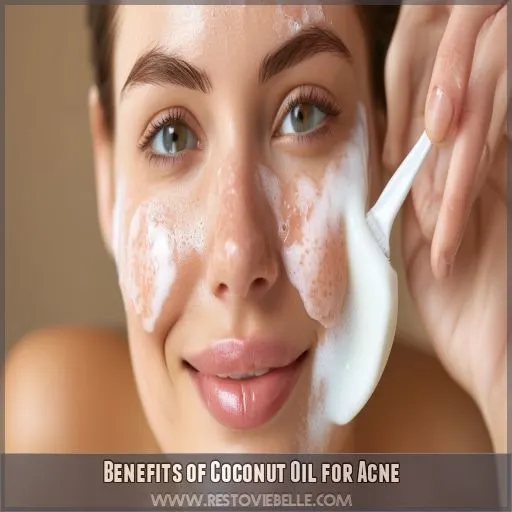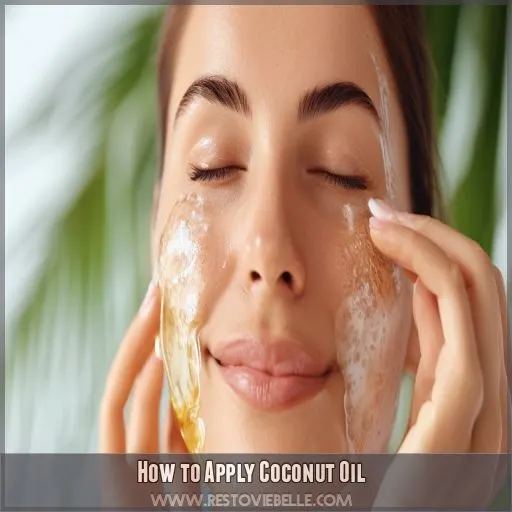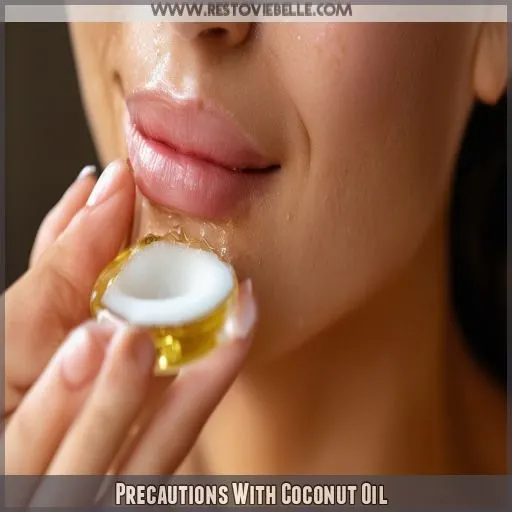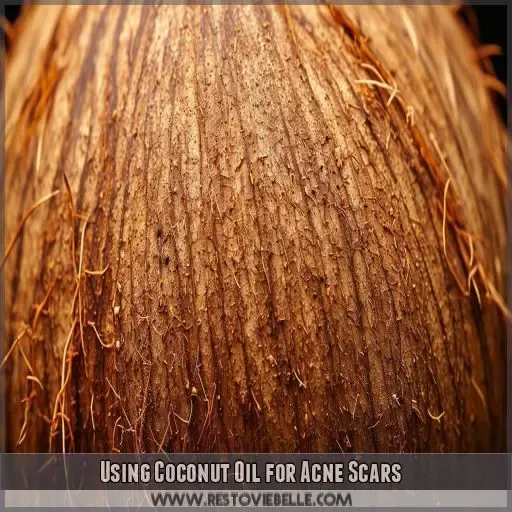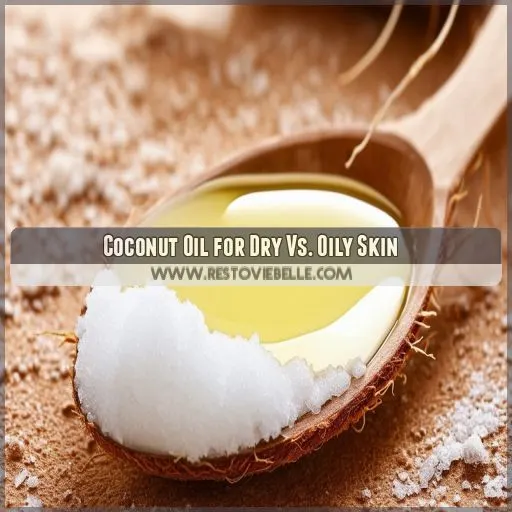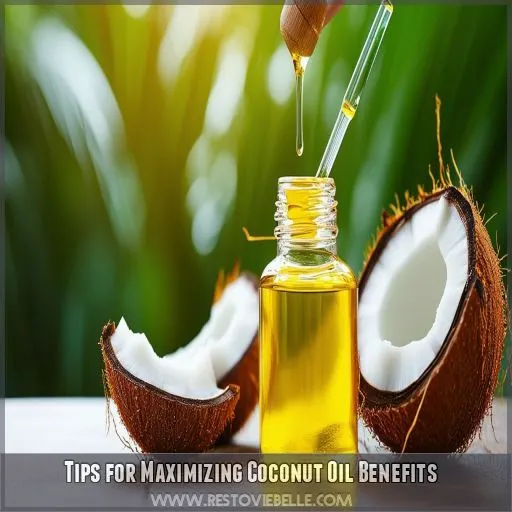This site is supported by our readers. We may earn a commission, at no cost to you, if you purchase through links.
 Wonder if coconut oil is the solution to your acne? This versatile, antibacterial, anti-inflammatory oil is considered by some to be a natural panacea for blemished skin.
Wonder if coconut oil is the solution to your acne? This versatile, antibacterial, anti-inflammatory oil is considered by some to be a natural panacea for blemished skin.
Before using it in skincare, understand its benefits and precautions: from choosing the right variety of coconut oil to making sure it doesn’t clog your pores.
Backed with evidence-based tips, we can help you attain that clear and healthy complexion. Let’s dive in.
Table Of Contents
- Key Takeaways
- How Do You Use Coconut Oil for Acne?
- Benefits of Coconut Oil for Acne
- How to Apply Coconut Oil
- Precautions With Coconut Oil
- Using Coconut Oil for Acne Scars
- Coconut Oil for Dry Vs. Oily Skin
- Tips for Maximizing Coconut Oil Benefits
- Frequently Asked Questions (FAQs)
- Is it good to apply coconut oil on acne?
- How to use coconut oil without clogging pores?
- How long do I leave coconut oil on my face?
- Can I apply coconut oil directly on my face?
- Can coconut oil help with hormonal acne?
- Is coconut oil effective for treating blackheads?
- How long does it take for coconut oil to clear acne?
- Can coconut oil be used with other acne treatments?
- Is coconut oil safe for sensitive acne-prone skin?
- Conclusion
Key Takeaways
- Coconut oil’s antibacterial properties make it a natural acne fighter, but beware of its potential to clog pores.
- Warm up coconut oil before applying it to your face, and don’t forget to rinse it off with a gentle cleanser to avoid clogged pores.
- Patch test coconut oil first to check for any allergic reactions, especially if you have sensitive skin.
- Coconut oil can be a great moisturizer for dry skin, but it’s not recommended for oily skin as it can worsen acne.
How Do You Use Coconut Oil for Acne?
To use coconut oil for acne, start by choosing organic, virgin oil with a USDA Organic seal. Warm a small amount by rubbing it between your palms or using a warm water bath. Apply to clean, dry skin, gently massaging to help it penetrate.
This oil’s antibacterial properties, particularly against P. acnes, and its anti-inflammatory benefits can reduce redness and swelling. However, coconut oil is highly comedogenic, so it may clog pores, especially in oily skin. Always patch test first to avoid allergic reactions.
Curious about maximizing these benefits? Here’s what you need to know next.
Benefits of Coconut Oil for Acne
Using coconut oil for acne can harness its antibacterial properties, thanks to lauric acid, which targets P. acnes bacteria. Additionally, it has anti-inflammatory effects that may help reduce redness and swelling associated with acne.
Antibacterial Properties
Coconut oil’s antibacterial effects make it an effective remedy against acne-causing bacteria. Lauric acid, a major component of coconut oil,:
- Kills P. acnes more effectively than benzoyl peroxide.
- Helps reduce acne inflammation by targeting bacterial growth.
- Offers a natural way to cleanse your skin and prevent future breakouts.
Anti-inflammatory Effects
The fatty acids in coconut oil may also help fight the inflammation associated with acne. Test-tube and animal studies suggest coconut oil has potent antioxidant and anti-inflammatory properties that could reduce the redness and swelling of acne lesions. However, it’s important to do a patch test first, as coconut oil can be comedogenic for some skin types.
How to Apply Coconut Oil
To apply coconut oil for acne, start by choosing organic, virgin coconut oil and warming it until it liquefies. Gently massage the warmed oil into your face, focusing on areas with makeup, then wash off with a gentle cleanser.
Choose Organic, Virgin Oil
Opt for organic, virgin coconut oil for maximum effectiveness. This type is unrefined and retains all beneficial compounds. Look for:
- USDA Organic seal for purity
- Cold-pressed to preserve nutrients
- Glass jars to avoid contaminants
- Non-GMO for added health assurance
Choosing the right type enhances the coconut oil benefits for your skin.
Warm Oil Before Use
To get the most out of coconut oil for acne, you’ll want to warm it up first. Simply hold the jar in your hands for a minute or two to liquefy the oil. This makes it easier to massage into your skin.
| Warming Technique | Benefits |
|---|---|
| Body Heat | Liquefies Oil Quickly |
| Microwave (10-15 secs) | Heats Oil Evenly |
| Double Boiler | Maintains Ideal Temperature |
Once warmed, gently massage the coconut oil into your face, focusing on areas prone to breakouts. Rinse thoroughly with a gentle cleanser and leave on overnight for extra hydration and acne-fighting benefits.
Precautions With Coconut Oil
When using coconut oil for acne, it’s important to be aware of its potential to clog pores, especially if you have oily skin. Additionally, always do a patch test first to check for any allergic reactions.
Risk of Clogging Pores
Coconut oil’s comedogenicity can lead to clogged pores, worsening acne severity for some skin types. Take these precautions:
- Assess Your Skin Type: Oily skin may be more prone to breakouts.
- Moderate Use: Don’t over-apply to minimize pore clogging.
- Patch Test: Test a small area first.
- Alternative Oils: Consider non-comedogenic options like grapeseed or sunflower oil.
Allergic Reactions
While coconut oil is generally safe for most people, it’s important to be mindful of potential allergic reactions. Always do a patch test before applying coconut oil to your face to check for any skin irritation or sensitivity. If you experience redness, itching, or breakouts, discontinue use and consider trying alternative oils like hazelnut or grapeseed oil that are less comedogenic.
Using Coconut Oil for Acne Scars
Always do a patch test before using coconut oil on acne scars to check that you’re not allergic to some of its constituent parts. Its enhancement of collagen production helps in wound healing and gives the skin a more even tone, less pitted with scars.
Patch Test Before Use
Always do a patch test before delving into coconut oil for acne scars. While it has the benefits of being antibacterial and a good moisturizer, the degree of comedogenicity in it can make it highly pore-clogging, which aggravates acne.
Just apply a little on your wrist or behind the ear, wait 24 hours, and check for allergic reactions against coconut oil for safe usage.
Collagen Production Benefits
Coconut oil may boost collagen production, aiding in the treatment of acne scars. Its anti-inflammatory properties can help your skin heal. Follow these steps for potential benefits:
- Patch-test carefully—ensure no allergic reactions.
- Consistency is key—apply regularly for best results.
- Massage gently—stimulate blood flow and recovery.
Always monitor your skin’s reaction.
Coconut Oil for Dry Vs. Oily Skin
Coconut oil can feel very nice on dry skin, but it will require much more caution in oily ones due to the very high degree of its comedogenicity. As it nourishes and hydrates, it may clog pores and really aggravate acne in those with oily skin.
Moisturizing Dry Skin
If you have dry skin, coconut oil may be your new best friend. Its nourishing properties can help replenish moisture and lock it in, thanks to its vitamin E and omega-3 fatty acid content. Massage the liquefied oil into your skin to remove impurities and excess sebum for a healthy, glowing complexion.
| Skin Type | Coconut Oil Suitability | Benefits |
|---|---|---|
| Dry | Suitable | Nourishing, moisturizing, vitamin E, omega-3s |
| Oily | Not Recommended | May clog pores, worsen acne |
| Combination | Use with Caution | Patch test first |
Cautions for Oily Skin
While coconut oil’s moisturizing properties benefit dry skin, its comedogenicity can spell trouble for oily skin. This highly pore-clogging oil may trigger skin irritation and exacerbate acne by promoting bacteria growth and inflammation. If you have oily skin, it’s prudent to opt for less comedogenic alternatives, and exercise caution when applying coconut oil to avoid worsening your condition.
Tips for Maximizing Coconut Oil Benefits
To maximize the benefits of coconut oil for acne, use it as a makeup remover by massaging warmed oil into your skin and then washing off with a gentle cleanser. Consider leaving it on overnight for extra hydration, but monitor your skin’s reaction and adjust accordingly.
Makeup Removal Technique
To remove makeup with coconut oil, gently massage the liquefied oil into your skin. This helps bind to and lift away impurities, excess sebum, and stubborn makeup. For best results:
- Warm the oil in your palms before applying.
- Massage in circular motions, focusing on problem areas.
- Rinse thoroughly with a gentle cleanser to avoid clogged pores.
Duration of Leave-on Time
Overnight Application For best results, apply coconut oil overnight. With this method, you’re able to hydrate your skin to the fullest and achieve maximum absorption. However, test for your skin type’s tolerance first. See the guide below:
| Skin Type | Typical Leave-on Time | Recommended Routine | Notes |
|---|---|---|---|
| Dry | Overnight | Daily use | Maximum hydration |
| Oily | Short (30 mins) | Alternate days | Can be pore-clogging |
| Combination | 1–2 hours | Observe for skins’ response | Monitor and adjust appropriately |
Frequently Asked Questions (FAQs)
Is it good to apply coconut oil on acne?
It’s not advisable to apply coconut oil on acne. While it has antibacterial and anti-inflammatory properties, it’s highly comedogenic and can clog pores, potentially worsening acne, particularly for oily skin types.
How to use coconut oil without clogging pores?
To use coconut oil without clogging pores, warm and liquefy the oil before application, then massage gently. Always wash off with a gentle cleanser and use sparingly. Patch-test to check for any adverse reactions.
How long do I leave coconut oil on my face?
Carefully cleanse, then coat your complexion with coconut oil. Calmly chill for 10-15 minutes, allowing the nourishing nutrients to seep in. Thoroughly rinse, revealing radiant, rejuvenated skin. Consistent care curbs acne’s curse.
Can I apply coconut oil directly on my face?
Yes, you can use coconut oil directly on your face, but do make sure that it’s patch-tested first. Use organic and virgin oil with caution if you have oily skin since it can block in the pores, aggravating acne.
Can coconut oil help with hormonal acne?
Over 70% of people experience hormonal acne, and while coconut oil’s lauric acid fights bacteria, it’s highly comedogenic. If you’ve got oily skin, it could worsen your acne. Use with caution and monitor your skin’s reaction.
Is coconut oil effective for treating blackheads?
Coconut oil may not be the best choice for treating blackheads. It’s highly comedogenic, meaning it can clog pores and potentially worsen breakouts. Opt for less pore-clogging oils or targeted blackhead treatments instead.
How long does it take for coconut oil to clear acne?
Using coconut oil to clear acne is like aligning the stars—you’ll need patience. Due to its comedogenic nature, it may worsen acne before any improvement. For most, it’s recommended to avoid coconut oil for acne treatment.
Can coconut oil be used with other acne treatments?
Yes, you can use coconut oil with other acne treatments. Apply it after cleansing but avoid combining it with highly comedogenic products, as coconut oil can clog pores. Always monitor your skin for adverse reactions.
Is coconut oil safe for sensitive acne-prone skin?
Even coconut oil may not be the best for very sensitive, acne-prone skin since some of its ingredients can potentially clog your pores and increase breakouts. Be cautious and definitely look into some gentler, non-comedogenic oils suited to your skin type so you don’t make things worse.
Conclusion
Imagine your skin to be a garden; the right care will definitely help in its healthy bloom. Coconut oil for acne can become that new gardening tool in your arsenal. While antibacterial and anti-inflammatory, it does contain potential benefits. But remember, only picking out organic virgin oil and performing a patch test are the most important steps. Watch out for pore-clogging and allergic reactions.
Knowing the precautions and techniques, coconut oil will help to achieve clearer skin with dry or oily skin concerns effectively.

